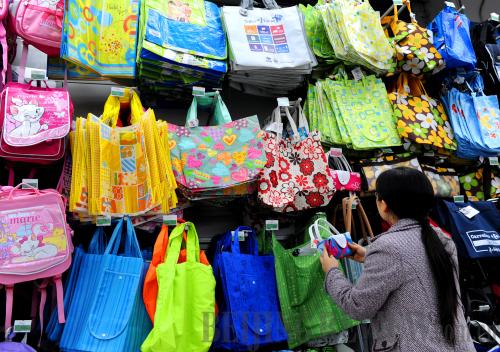|
 |
|
COLORFUL SUBSTITUTES: A woman selects reusable cloth shopping bags in a market in Qingdao, Shandong Province (LI ZIHENG) |
In the beginning, many plastic shopping bag producers stopped producing ultra-thin products. Data collected by the International Food Packaging Association show after the ban was implemented, half of the more than 30,000 plastic shopping bag producers in China suspended operation. Yet, 80 percent of those firms closed down, or having switched to other products, had resumed producing plastic shopping bags, though not necessarily ultra-thin ones, Dong said.
More disturbingly, the consumption of plastic wraps in supermarkets has increased significantly. The Beijing Municipal Development and Reform Commission recently said the increase was more than 55 percent, and the wraps were often used for one time and then discarded.
Salespersons in a Carrefour supermarket in Beijing's Zhongguancun area acknowledged customers often tore extra free plastic wraps to hold things so that they no longer needed to buy plastic shopping bags at the checkout counter.
More efforts necessary
In spite of the mixed results of the policy to curb plastic shopping bag use, Li said the NDRC intended to expand it to bookstores, pharmaceutical stores and restaurants.
To reduce the use of plastic shopping bags, experts suggest on one hand, the general public should be educated to change their consumption behaviors, and on the other hand, measures should be taken to reduce the availability of plastic shopping bags to vendors and increase their purchasing costs. Regulators should also step up oversight.
"More education programs should be launched to raise the public awareness of the harm of white pollution, a byword for pollution caused by plastic shopping bags with reference to the color of many bags, and help customers gradually form a habit of reusing plastic shopping bags and substitute plastic bags with baskets and cloth bags," said Dong Wenbo, a Fudan University professor in environmental science and engineering.
Li also called on local governments to play a bigger role in implementing the restrictions on plastic shopping bags, and incorporate it into their efforts in building environment-friendly cities or rural markets.
Moreover, market place owners should be held responsible for the policy's implementation, and those shirking their duties should be seriously punished, Li said.
It is unrealistic to hope the environmental problems caused by plastic shopping bags could be solved by merely charging money for their use, Professor Dong said. A proper system to recycle and reuse plastic shopping bags should be established and suitable substitutes should be found, he said.
The difficulty in limiting the use of plastic shopping bags is they are really handy, and it is not easy to find good substitutes, said Sun Yingjun, an associate professor at Shandong Jianzhu University. Despite this, Sun suggests the government should spare no efforts to boost research on good substitutes and promote their usage. | 